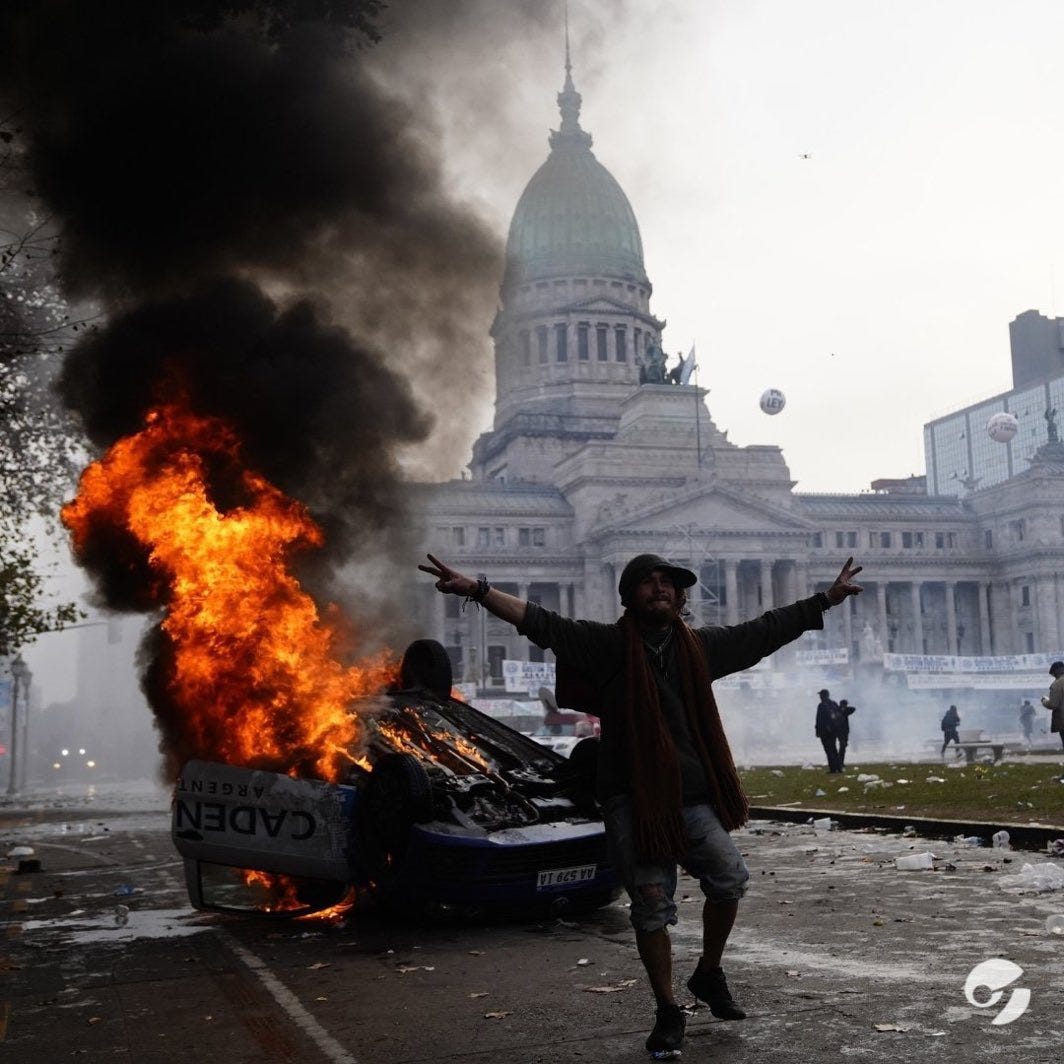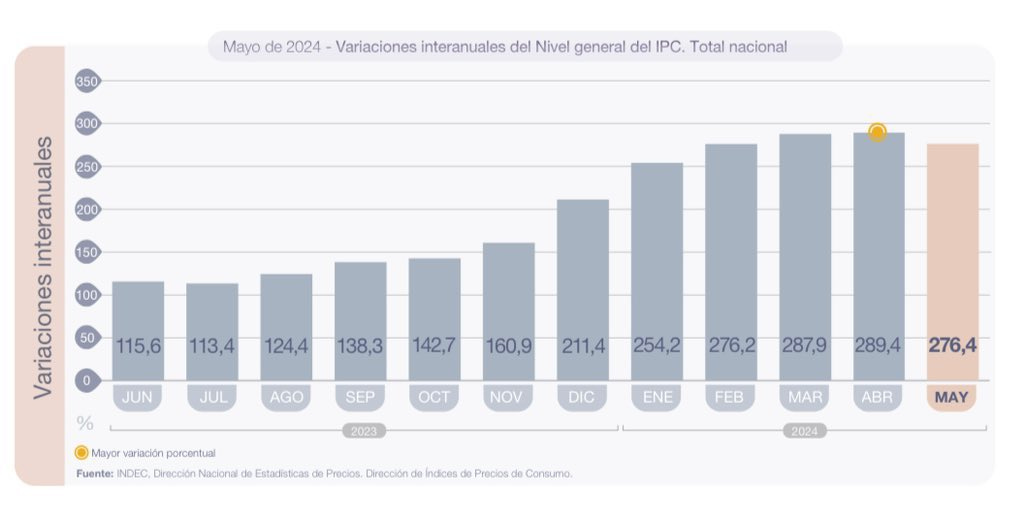Based Laws & Economic Transformation
What is the direct impact of yesterday's Omnibus Bill approval in the Senate?
Welcome Avatar! After a short and euphoric night, Argentina has made its first step towards a more open economy and less State intervention: the Senate approved all chapters of the Omnibus Law with only slight modifications. What will happen now, and what is the impact of this bill?
After a 12-hour long debate, during which opposition rioters outside of the Congress building tried to do as much damage as possible to cars, buildings, public spaces and the security forces, the final votes for the Omnibus Law in the Senate were in yesterday just before midnight.
Vice President Villarruel had the final vote because it was a 36/36 tie. As she pulled on vote from the negativos and placed it in the afirmativos, she said:
"For those Argentines who deserve to recover the pride of being Argentine and always thinking of everything for Argentina , my vote is affirmative"
That gave the starting sign for the treatment of each individual chapter of the law, which was voted on individually.
Quick Rundown
Yesterday, many who were following the votes asked for a run down on what was being voted on. Besides the longer article The May Pact & Omnibus Revival, the breakdown of the bill is as follows:
Chapter 1: Economic emergency is declared and powers are delegated to the president.
The powers in which decisions can be made by decree without going through Congress are extended (the same powers that all presidents had from 1983 to today) - HUGE
Chapter 2: State Reform.
Organizations, agencies and entities can be closed by decree
The “planta permanente” (permanent employees) option is eliminated in the State
Several state companies can be privatized
Chapter 3: Contracts and transactional agreements
Public-private work is introduced
State concessions to the private sector are expanded
Chapter 4: Promotion of Registered Employment
Ease of regularizing employees’ situation and get them “on the books” without a fine
Chapter 5: Labor market modernization
Employee hiring is made easier
New forms of contracting are introduced
Entry and exit barriers are eliminated in employment contracts
Trial periods are extended
Dismissal insurance is introduced as an alternative to compensation (to end the labor lawsuit industry)
The labor market is deregulated
Chapter 6: Energy reform
The energy market is deregulated
The concept of energy sovereignty (self-sufficiency) is replaced by that of maximizing income (free trade)
Exploration and exploitation rights are expanded
Hydrocarbon trade is liberated
Chapter 7: RIGI
Tax, exchange and legal benefits are granted for 30 years to those who want to invest more than 200 million dollars in Argentina
Similar to the investment promotion regimes that Chile, Ireland and Spain had during their economic miracles
Chapter 8: Moratorium (*It was rejected in the Senate but could be reintroduced in the Chamber of Deputies)
The possibility of retiring without contributions is eliminated
Retirements without contributions are replaced by an old-age subsidy for the elderly who are below the poverty line
Chapter 9: Tax measures for tobacco
The minimum tax is eliminated
The tax on cigarettes is raised from 70 to 73%
The fact that this passed is revolutionary, even more so in Argentina.
Besides the retiree moratorium being rejected, everything else was passed.
The retirees issue — currently people can retire without having contributed to their retirement —, was initially done because such a large part of the economy runs off the books, but you can imagine that this is completely unsustainable in the long run.
Where do we go from here?
From here on out the rest of the law is just a formality. Both chambers approved it but Senators added +/- 40 corrections.
Now the law goes back to the Chamber of Deputies, who must choose between the first text they approved or the corrected one by the Senate. Either way this doesn't matter, since it is approved. After this Milei signs it and it's done.
One of the most important items is the additional powers for Milei to circumvent both chambers. This is a pretty standard thing for first term presidents (all were given these powers), but with Milei it suddenly was the first time that this was posed as “dictatorial” and “a problem”. Good thing they approved it anyway, since it makes deregulation and gutting bureaucracy and taxes a lot easier.
Previous president Alberto Fernández received even more powers in the first week of his presidency, being able to govern without needing the Senate that often. These powers were given for six months at the time, but were extended and extended as the pandemic dragged into a two year inferno.
This 6-months delay with Milei clearly shows how much pushback his administration is receiving, and how the political elite is trying to do everything in its powers to maintain the status quo.
My assumption is the decrees will start flying from here, and more laws from the original Omnibus Law will be reintroduced separately.
Overview of the full (original) version of the law:
In the end the May Pact was not an option because the Senate wasn’t able to treat the bill before May 25th, so now the Government's idea is that on July 9 (Argentina’s Independence Day), with the Omnibus Law chapter closed, President Javier Milei will lead a "massive and popular" event in Tucumán, to relaunch the failed May Pact.
The law should be done and dusted before that, and signed by Javier Milei. As confirmed by the presidential spokesman, Manuel Adorni, the modifications made to the text will be debated in the chamber of Deputies in the last week of June.
The “forces of heaven” will seek to insist that the text be approved as it came out of the Lower House. For this, the negotiations led by Francos will continue this week.
The Government will not give up on the income tax in the separate fiscal bill that was presented earlier in May, or the privatizations it had to give up on in the Senate (Aerolíneas Argentinas and Correo Argentino).
Autist note: after the passing of the Omnibus package, these are some of the main headwinds that the Milei administration is facing:
Response
Markets responded positively on the news, with Argentina bonds gaining more than 3% and stocks up to 9%.
The JPM country risk index also saw a sharp decrease (-7%) and so did the blue dollar rate (from $1,300 to $1,220).
Later in the day official CPI numbers were released, and these are all trending downwards very quickly:
After the news of the Omnibus Law passing in the Senate, the IMF board approved the disbursement of USD 800 million today (which was still part of the 2018 agreement) and asked to “improve the quality of fiscal adjustment”.
President Milei will meet with the IMF board tomorrow to accelerate the negotiation of a new program with more financing. Personally this Patagonian rodant would prefer to see Argentina get out of the debt hole by rolling maturities over once more, but chances are very unlikely (creditors have already gone through this process once and want to get paid).
That only leaves more financing on the table, because it is to be seen how quickly foreign capital will start pouring in even with the groundbreaking changes the Milei government is realizing in the country.
My guess is that big investments will only start coming in after the 2025 midterms or at the start of a second Milei term.
The danger of another swing to Peronism in 2027 is all too real, after investors saw how Mauricio Macri basically handed them the elections on a platter in 2019.
Now that the RIGI passed (the tax benefits for 200M+ projects), there are a couple of projects that will start soon — I will write about those investments in more detail in another article.
Final Thoughts
The approval of the Omnibus Law, even in the final “dumbed down” version, constitutes the first political victory for the Milei government, and it was rightly celebrated as such.
The articles include many items that most people never thought they would see approved in any way, shape, or form. This paves the way for more economic freedom, and will make it easier for the country to recover from the current recession.
Another welcome surprise yesterday was that China agreed to extend its swap agreement until June 2026, which is another $5 billion USD that the BCRA does not have to miss right now.
Argentina is still very far removed from smooth sailing, especially if you look at the dollar debt maturities that Milei will face during this admin, but without more economic deregulation, that roadblock would be even harder to overcome.
See you in the Jungle, anon!
Other ways to get in touch:
1x1 Consultations: book a 1x1 consultation for more information about obtaining residency, citizenship or investing in Argentina here.
X/Twitter: definitely most active here, you can also find me on Instagram but I hardly use that account.
Podcasts: You can find previous appearances on podcasts etc here.
WiFi Agency: My other (paid) blog on how to start a digital agency from A to Z.












Wow, great news (may the Forces of Heaven prevail!). Thanks, Mara
This is amazing news! Thanks for the typically excellent reporting and analysis. I am also seeing a lot of pushback against DEI in the United States. I'm also starting to feel some hope!